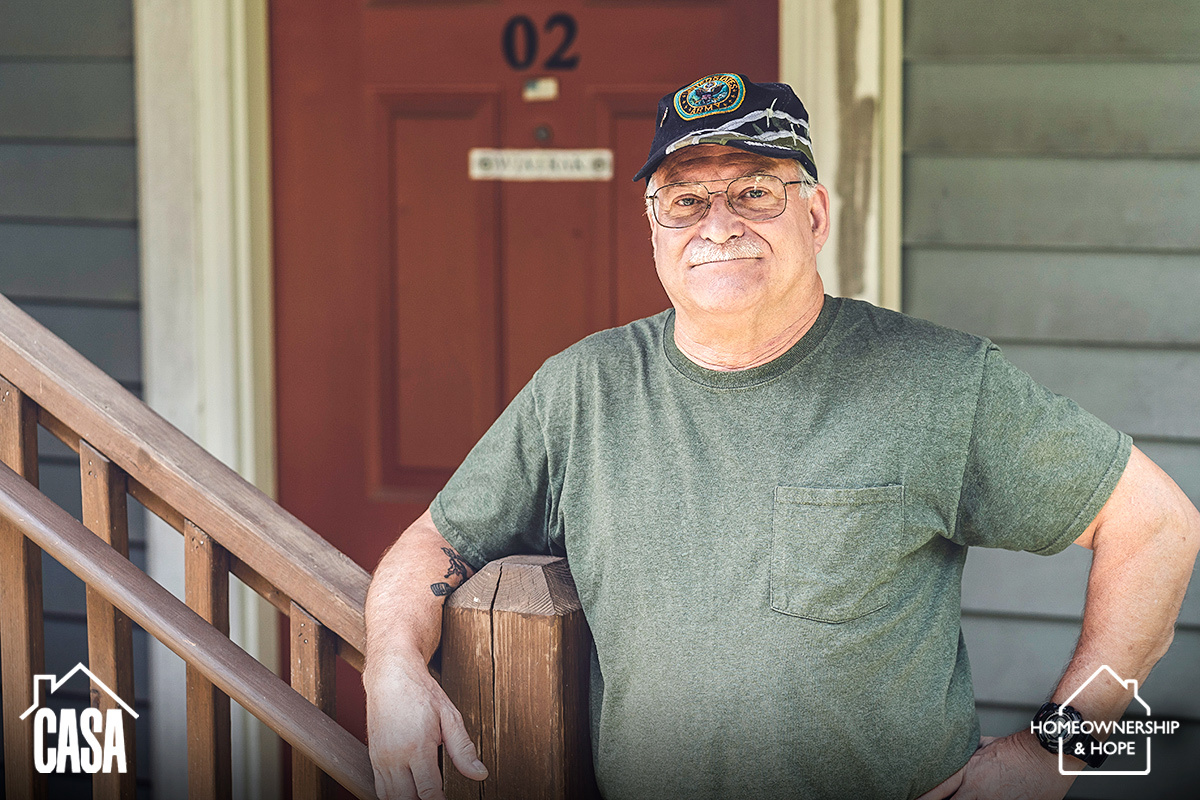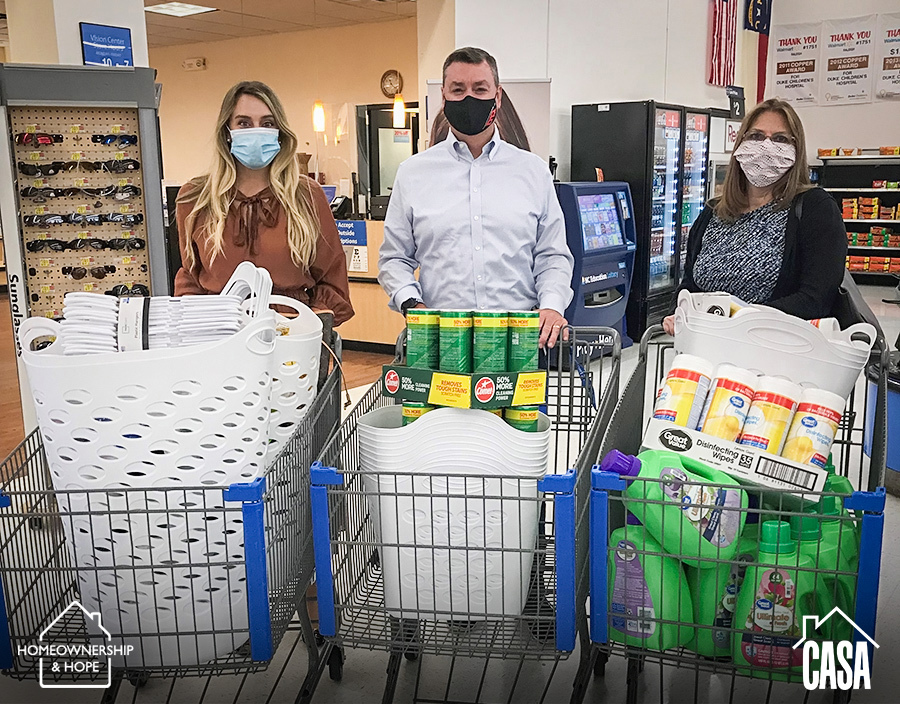Leadership. Teamwork. Adaptability.
Bill Wiatrak’s military service offered many lessons, but perhaps the greatest was the value of looking out for others. Six decades later, that’s taken on an entirely new meaning.
“If it weren’t for CASA, I wouldn’t be living,” said Wiatrak. “I got my life back thanks to them.”
Wiatrak isn’t alone. Nearly 700 others are also grateful to CASA for offering a safe haven. The nonprofit provides affordable, sustainable housing for veterans, people with disabilities and families facing financial challenges around North Carolina’s Research Triangle area, including Raleigh, Durham and Chapel Hill.
CASA does this by developing and managing 50 communities where most tenants pay no more than 30% of their annual income – whatever that may be – for rent.
“We believe everyone deserves a place to live that’s safe and comfortable,” said Emma Hansen, grants and communications manager for CASA. “Seventy percent of our residents have a disability; 30 percent work but may be in low-wage jobs, meaning they might not be able to rent from a conventional landlord. Our goal is to help people who have been in homeless shelters or transient housing move into a lasting, permanent home.”
Regions Bank in Raleigh began working with CASA in 2019 by sponsoring the nonprofit’s annual “Home, Sweet Home” fundraiser. After meeting some of CASA’s residents, Kelly Perkins saw an opportunity to do more.
 Bill Wiatrak has lived at one of CASA’s two properties housing veterans for the past eight years. He credits the nonprofit’s supportive staff and his neighbors with offering him hope for the future.
Bill Wiatrak has lived at one of CASA’s two properties housing veterans for the past eight years. He credits the nonprofit’s supportive staff and his neighbors with offering him hope for the future.
“The idea popped in my head that we could put together baskets filled with essential household items as a welcome gift for new residents,” recalled Perkins, a Commercial Banking relationship manager for Regions.
The idea caught on quickly with her teammates, who help her shop for, compile and deliver baskets filled with necessities whose costs can quickly add up.
“Moving to a new home should be a time of possibilities, excitement and hope,” said Terry Hoey, mortgage production manager and market executive for Regions Bank in Raleigh. “By providing the ‘homestarter’ baskets, our goal is to eliminate some of the economic stress associated with moving and to make the transition easier for families who’ve faced housing instability.”
Long before Bill Wiatrak faced housing instability himself, he was part of the U.S. Army’s 101st Airborne, an elite unit known as the “Screaming Eagles.” Following basic training at Fort Campbell, Wiatrak traveled to Belgium in 1964 with American troops who would be heading to Vietnam just months later.
“The 101st Airborne’s role is to go in first to help all combat troops,” explained Wiatrak. “Our unit was responsible for ensuring we had all vehicles and supplies in place. The United States would look much different today without the 101st Airborne.”
After four years of military service, Wiatrak returned from overseas and put the mechanic skills he’d learned to work. In the decades that followed, he managed a tire center, taught brake suspension classes at Wake Tech Community College, earned his commercial driver’s license and started a business.
But chronic pain from injuries he’d sustained while serving plagued Wiatrak. Then came the devastating blow of having to close his business. Wiatrak thought he’d lost everything – until a medical visit opened a new door to hope.
“I learned about CASA through a friend at the VA Hospital,” Wiatrak recalled. “For two years, they allowed me to stay for nothing. I couldn’t believe it in the beginning.”
CASA has a team specifically dedicated to helping veterans like Wiatrak.
Our Housing Specialists work with the VA to help move veterans out of transitional housing and into a permanent home. They also help in other times of crisis, whether that’s a financial hardship or behavioral crisis, and they connect our residents with community resources.
Emma Hansen, grants and communications manager for CASA
“Our Housing Specialists work with the VA to help move veterans out of transitional housing and into a permanent home,” said Hansen. “They also help in other times of crisis, whether that’s a financial hardship or behavioral crisis, and they connect our residents with community resources.”
Now an eight-year resident, Wiatrak is thriving in one of two CASA veteran communities. Emma Hansen sees the special bond among their tenants.
“They check on each other,” she said. “If they haven’t seen or heard from each other, they call to make sure they’re okay.”
“Emma is a godsend,” Wiatrak added. “The people in these apartments have stories; they have lives. If we have problems, we can call them. And whenever you see someone from CASA, the first thing they do is smile; that’s worth a thousand words.”
Kelly Perkins, Terry Hoey and additional Regions associates are doing their part to create smiles by preparing the next batch of housewarming baskets for new residents just in time for the holidays. Along with the usual items like laundry detergent and soap, Perkins will be purchasing some additional gifts.
 Regions associates Kelly Perkins, Terry Hoey and Cindy Forrester (left to right) shop for essentials to compile housewarming baskets for new CASA residents.
Regions associates Kelly Perkins, Terry Hoey and Cindy Forrester (left to right) shop for essentials to compile housewarming baskets for new CASA residents.
“I’m making a few of the baskets baby-oriented,” she said. “Having just had a baby myself, I know how important those specific items are. I feel blessed to work for a company that allows me to go out into my community and support nonprofits like CASA.”
“The pandemic has resulted in more food insecurity and housing instability among our most vulnerable citizens,” added Hoey. “Doing all we can to help, especially at this time, is our responsibility as bankers, neighbors and, most importantly, as human beings.”
Some may say it’s just a basket. But Emma Hansen will tell you it represents far more.
“Our residents are so grateful,” she said. “It’s amazing to watch their reactions to such an act of kindness and love.”
Further proof that the gift of someone else looking out for you is priceless. Just ask Bill Wiatrak.